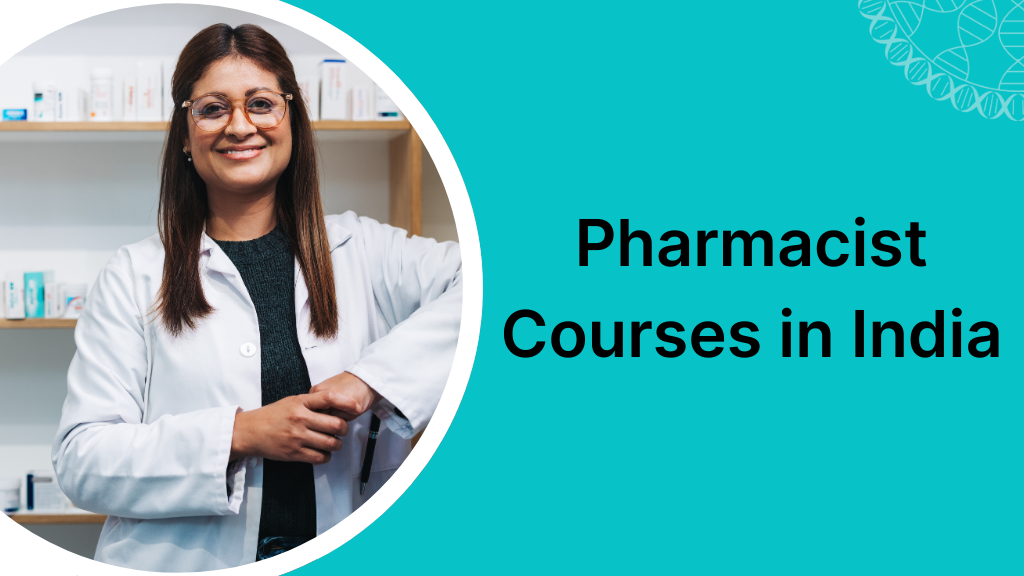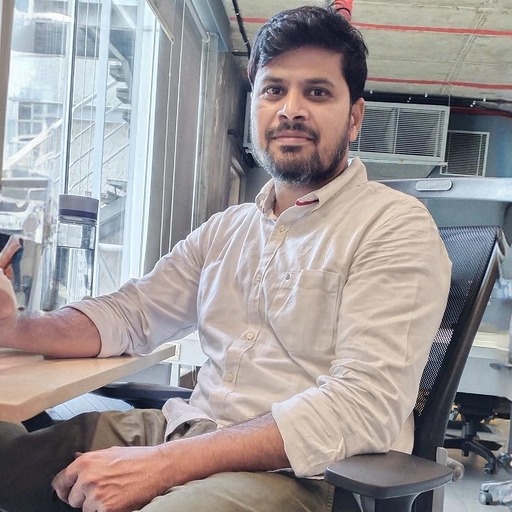
Pharmacist Courses in India: A Complete Guide

11-Feb-2025
Pharmacist Courses in India: A Complete Guide
Introduction
Pharmacy is a growing field in India, offering many career opportunities for students interested in medicine and healthcare. A pharmacist plays a crucial role in the healthcare system by dispensing medicines, advising patients, and ensuring the safe use of drugs. To become a licensed pharmacist in India, students must complete specific pharmacy courses and obtain registration from the Pharmacy Council of India (PCI).
This guide provides complete details about pharmacy courses in India, including eligibility, colleges, fees, job opportunities, and salary expectations.
Types of Pharmacy Courses in India
Pharmacy education in India includes diploma, undergraduate, postgraduate, and doctoral programs. The most popular pharmacist courses are:
1. Diploma in Pharmacy (D. Pharma)
- Duration: 2 years
- Eligibility: 10+2 (Science stream with Physics, Chemistry, and Biology/Mathematics)
- Admission Process: Merit-based or entrance exam
Top Colleges:
- Jamia Hamdard, New Delhi
- Government Pharmacy College, Bangalore
- Poona College of Pharmacy, Pune
The D. Pharma course is suitable for students who want to become a registered pharmacist quickly and start working in medical stores or hospitals.
2. Bachelor of Pharmacy (B. Pharma)
- Duration: 4 years
- Eligibility: 10+2 (Science stream with Physics, Chemistry, and Biology/Mathematics)
- Admission Process: Entrance exams like GPAT, WBJEE, BITSAT Pharmacy, or state-level exams
Top Colleges:
- National Institute of Pharmaceutical Education and Research (NIPER)
- Manipal College of Pharmaceutical Sciences
- JSS College of Pharmacy
The B. Pharma course prepares students for careers in pharmaceutical companies, hospitals, and regulatory bodies.
3. Master of Pharmacy (M. Pharma)
- Duration: 2 years
- Eligibility: B. Pharma degree with a minimum percentage (varies by college)
- Admission Process: GPAT (Graduate Pharmacy Aptitude Test)
Top Colleges:
- National Institute of Pharmaceutical Education and Research (NIPER)
- Institute of Chemical Technology, Mumbai
- Panjab University, Chandigarh
An M. Pharma degree is best for students interested in research, quality control, or academia.
4. Doctor of Pharmacy (Pharm.D)
- Duration: 6 years (including 1-year internship)
- Eligibility: 10+2 (Science) or D. Pharma
- Admission Process: Merit-based or entrance exam
Top Colleges:
- JSS College of Pharmacy
- Manipal College of Pharmaceutical Sciences
- PSG College of Pharmacy
Pharm.D is a clinical pharmacy course that allows graduates to work in hospitals and healthcare settings as clinical pharmacists.
5. PhD in Pharmacy
- Duration: 3-5 years
- Eligibility: M. Pharma or equivalent degree
- Admission Process: Entrance exam (GPAT, CSIR-NET, etc.) and interview
Top Institutes:
- NIPER
- Jamia Hamdard University
- Banaras Hindu University (BHU)
A PhD in Pharmacy is ideal for those who want to work in research, teaching, or drug development.
Pharmacy Entrance Exams in India
To get admission into top pharmacy colleges, students need to appear for entrance exams like:
- GPAT (Graduate Pharmacy Aptitude Test): National-level exam for M. Pharma admissions
- WBJEE Pharmacy: For admission in West Bengal pharmacy colleges
- BITSAT Pharmacy: Conducted by BITS Pilani
- MHT CET Pharmacy: Maharashtra state entrance exam
Career Opportunities for Pharmacists in India
After completing a pharmacist course, graduates can work in various fields:
1. Retail Pharmacist
- Works in medical stores, pharmacies, and hospitals
- Dispenses medicines and provides drug information
- Can start their own pharmacy business
2. Hospital Pharmacist
- Works in government and private hospitals
- Ensures correct medication use for patients
- Collaborates with doctors and nurses
3. Clinical Pharmacist
- Works in healthcare settings and assists in patient care
- Focuses on drug therapy management
4. Pharmaceutical Industry
- Works in drug manufacturing, quality control, and research
- Job roles include production manager, quality analyst, and research scientist
5. Regulatory Affairs
- Works with government agencies like CDSCO and FDA
- Ensures drugs meet safety and quality standards
6. Academia and Research
- Becomes a lecturer or professor in pharmacy colleges
- Conducts research in pharmaceutical sciences
Salary of a Pharmacist in India
The salary of a pharmacist in India depends on the qualification, experience, and job role. On average:
- D. Pharma Graduate: ₹2-3 LPA
- B. Pharma Graduate: ₹3-6 LPA
- M. Pharma Graduate: ₹5-10 LPA
- Pharm.D Graduate: ₹6-12 LPA
- PhD in Pharmacy: ₹8-20 LPA
Pharmacists in the pharmaceutical industry and research earn higher salaries compared to retail and hospital pharmacists.
Best Pharmacy Colleges in India
Some of the best pharmacy colleges in India include:
- National Institute of Pharmaceutical Education and Research (NIPER)
- Jamia Hamdard University, New Delhi
- Manipal College of Pharmaceutical Sciences
- Institute of Chemical Technology, Mumbai
- JSS College of Pharmacy
Future of Pharmacy in India
With the growth of the pharmaceutical industry and healthcare sector, demand for skilled pharmacists is increasing. E-pharmacies, clinical trials, and drug research are creating new job opportunities. Courses like B. Pharma, M. Pharma, and Pharm.D offer excellent career prospects in India and abroad.
FAQs: Pharmacist Courses in India
1Q: What is a Pharmacist Course?
Ans: A pharmacist course teaches students how to handle medicines properly. It includes learning how to prepare, store, and give the right medicines to patients. This course also helps you understand how different medicines work inside the body.
2Q: Which are the main pharmacist courses in India?
Ans: Here are the popular pharmacist courses:
- D.Pharm (Diploma in Pharmacy): 2 years
- B.Pharm (Bachelor of Pharmacy): 4 years
- Pharm.D (Doctor of Pharmacy): 6 years
- M.Pharm (Master of Pharmacy): 2 years (after B.Pharm)
3Q: Who is eligible to apply for these courses?
Ans: You must have passed 12th standard with Science stream (Physics, Chemistry, and Biology or Maths). Most colleges require at least 50% marks, and some may also conduct entrance exams.
4Q: What will I learn in these pharmacy courses?
Ans: You will study:
- Human anatomy and physiology
- How drugs affect the body
- Making and storing medicines
- Pharmacy laws and ethics
- Laboratory practices and safety
5Q: What is the difference between D.Pharm and B.Pharm?
Ans: D.Pharm is a short-term course and is suitable for starting a career quickly as a pharmacist or to open a medical shop.
B.Pharm is a full degree course and provides deeper knowledge and better job opportunities in industries, hospitals, or research fields.
6Q: What are the average fees for these courses?
Ans:
- D.Pharm: ₹25,000 to ₹1 lakh per year
- B.Pharm: ₹40,000 to ₹1.5 lakh per year
- Pharm.D: ₹1 lakh to ₹2.5 lakh per year
Fees depend on the college type (government or private) and location.
7Q: What jobs can I get after completing a pharmacist course?
Ans: You can work as:
- Hospital or clinical pharmacist
- Retail medical shop pharmacist
- Quality control officer in pharma companies
- Drug inspector (after qualifying exam)
- Medical representative or sales executive
8Q: How much salary can I expect after the course?
Ans:
- D.Pharm graduates: ₹10,000 to ₹20,000 per month (fresher)
- B.Pharm graduates: ₹15,000 to ₹30,000 per month
- Pharm.D holders: ₹30,000 to ₹50,000 or more per month
Salary increases with experience, skills, and location.
9Q: Can I open a medical shop after D.Pharm?
Ans: Yes, after completing D.Pharm and registering with the Pharmacy Council, you are legally allowed to open and run a pharmacy or medical shop in India.
10Q: Can I study further after B.Pharm?
Ans: Yes, you can do:
- M.Pharm (in specializations like Pharmacology, Pharmaceutics, etc.)
- Pharm.D (Post Baccalaureate)
- You can also go for MBA in Healthcare or Ph.D. in Pharmacy later.
11Q: Is pharmacy a good career option in India?
Ans: Yes, pharmacy is a growing field in India. There is demand for skilled pharmacists in hospitals, clinics, research labs, and pharmaceutical companies. You can also start your own business after some experience.
12Q: Are there government job opportunities for pharmacists?
Ans: Yes, many government hospitals, railways, defence, and public health departments recruit pharmacists. You need to apply through state or national level exams like SSC, UPSC, or state PSC.
Conclusion
Pharmacy is a rewarding career with diverse job opportunities in hospitals, pharmaceutical companies, research, and regulatory bodies. Students can choose from diploma, undergraduate, postgraduate, and doctoral courses based on their career goals. By completing a recognized pharmacy course and registering with the Pharmacy Council of India (PCI), you can build a successful career as a licensed pharmacist in India.
If you are interested in becoming a pharmacist, choose the right course and start your journey today!

AUTHOR


Related Jobs


